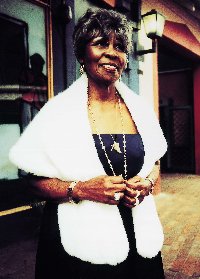 |
Dorothy Masuka was originally from Zimbabwe but spent her formative years in South Africa.
Dorothy and Miriam Makeba, who were best friends then and are still now, toured Southern Africa together, and competed on the charts with one hit song after another. She has had an interesting life, … had history been kinder to Dorothy, she probably would have achieved comparable international fame as Miriam since her singing style, song writing gifts, and political activism are comparable.
Dorothy was the fourth of seven children and when her father left the family home for Port Elizabeth, Dorothy moved to South Africa. She was in poor health, and the family thought the dry southern climate would be good for her. She was just twelve years old.
Dorothy blossomed as a singer at school concerts. She also discovered popular music, and developed a particular ear for American jazz. It wasn't long before she realised that great things were happening in the music scene around her as well. Her break came a few years later when she was invited to audition for a new record label called Troubadour. She got the job, earning, as she recalls, five or ten pounds for her first recording!
At sixteen, she became swept up in the music scene, She ran away from her School to join Philemon Mogotsi's African Ink Spots in Durban. She was soon apprehended and returned to Johannesburg, but quickly made off again, this time back to Bulawayo, where she struck up with a young jazz group called the Golden Rhythm Crooners.
Dorothy also along with Miriam Makeba and Hugh Masekela performed in the travelling road show African Jazz and Variety and in the South African Broadway-style musical King Kong.
She wrote "Hamba Notsokolo," one of the biggest South African hits of the 1950s, and still a staple in her songbook.
Dorothy saw herself as a composer at least as much as a singer, and she naturally began to take on serious themes in her songs.
Her song "Dr. Malan"--which included the line "Dr. Malan has difficult laws."--earned the attention of South Africa's feared Special Branch, which paid her a visit and promptly banned the record. When she sang for Lumumba, the fallen hero of Congolese independence, in 1961, the Special Branch seized the master and all copies of the record they could find. As it happened, Masuka had returned to Bulawayo, and the label advised her to stay there until things settled down.
She was exiled from South Africa for 31 years, and worked in Malawi and Tanzania
A pariah in South Africa and her native Zimbabwe, Dorothy settled in Zambia where she spent an anonymous existence as a flight attendant until Zimbabwean independence in 1981. Like Miriam with the release of Nelson Mandela she was in 1992, allowed to return to South Africa.
Her original recordings from Troubador Records have been preserved on an album called Hamba Notsokolo which Gallo records have released. Although the quality is not brilliant the powerful essence of Dorothy’s voice comes through clearly.
Her 1990 album Pata Pata recognised new realities, mixing her customary jazz songs with more contemporary sounds, including Shona traditional pop.
Dorothy’s latest album Mzilikazi is a masterful production filled with musical gems that prove the case that she deserves worldwide recognition as one of African music's greatest figures. The album updates the South African jazz style of the 1950s with sophisticated contemporary arrangements.
|
|